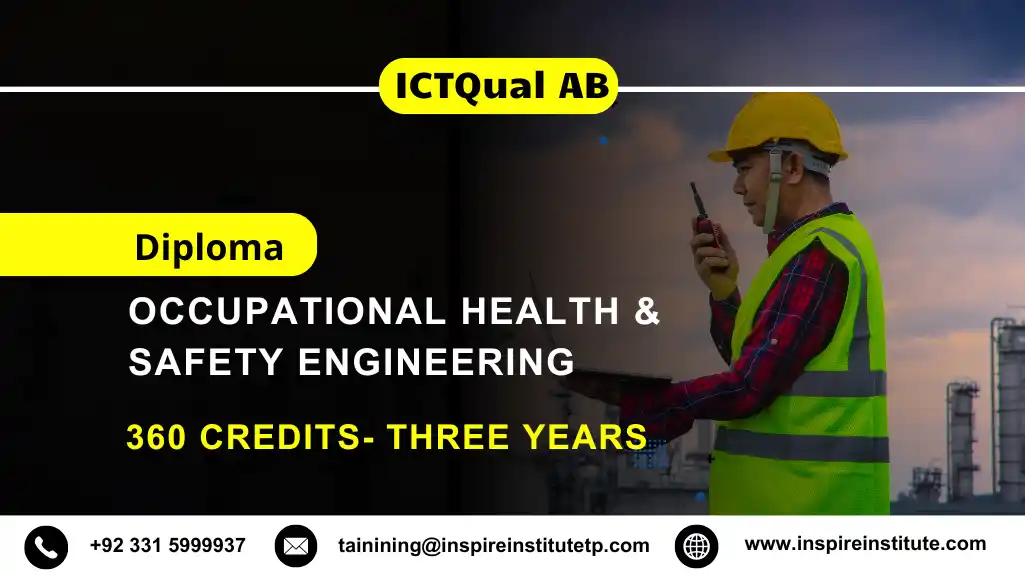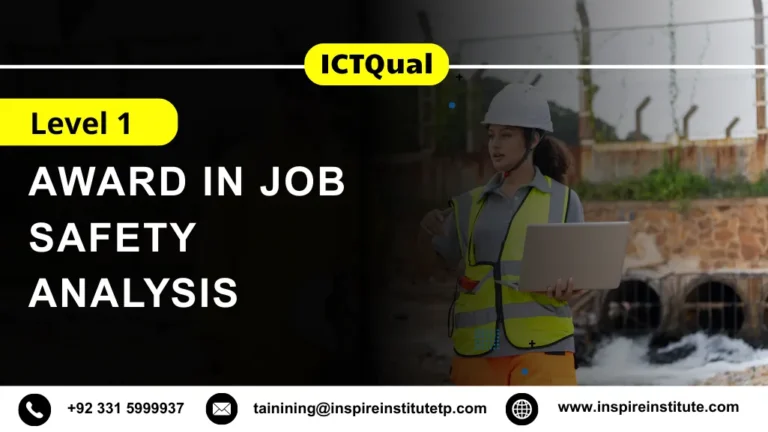ICTQual AB Diploma in Occupational Health and Safety Engineering 360 Credits- Three Years
The ICTQual AB Diploma in Occupational Health and Safety Engineering (360 Credits – Three Years) is a comprehensive UK-accredited programme designed to equip learners with the knowledge, skills, and competencies required to create safer working environments across industries. Structured over three years and worth 360 credits, this diploma offers a balance of theoretical learning and practical application, making it suitable for both freshers seeking a solid career foundation and experienced professionals aiming to enhance their expertise in occupational health and safety management.
This diploma covers a wide range of essential topics, including workplace risk assessment, hazard identification, accident prevention, safety engineering principles, and regulatory compliance. Learners will also gain a deep understanding of international health and safety standards, environmental management, and the integration of safety systems into daily operations. By combining engineering knowledge with occupational safety practices, the programme ensures learners can apply effective strategies to reduce workplace incidents and promote a culture of safety.
The three-year structure allows learners to progress through a carefully designed pathway, gradually developing advanced technical and managerial skills. With an assignment-based approach, the programme offers flexibility, enabling learners to study alongside professional or personal commitments. This makes it an ideal choice for those entering the field as well as working professionals seeking to strengthen their qualifications.
Graduates of this diploma will be well-positioned for rewarding careers in industries such as construction, oil and gas, manufacturing, healthcare, and engineering. The qualification provides a stepping stone towards higher education, professional recognition, and leadership roles in occupational health and safety. By completing this programme, learners demonstrate a strong commitment to ensuring workplace safety, improving employee wellbeing, and meeting the growing demand for skilled safety engineers in today’s dynamic industries.
Why Choose this Qualification
The ICTQual AB Diploma in Occupational Health and Safety Engineering (360 Credits – Three Years) is a prestigious UK-recognised qualification designed to equip learners with advanced expertise in occupational health and safety (OHS) principles, engineering controls, and risk management. Spanning three years and carrying 360 credits, this diploma offers a comprehensive framework for understanding workplace hazards, safety engineering, regulatory compliance, and sustainable safety practices. It blends theoretical knowledge with practical application, ensuring learners develop strong analytical, problem-solving, and leadership skills while applying safety engineering principles in real-world industrial and organisational environments. The programme is structured to meet the needs of both fresh learners seeking a solid foundation in OHS engineering and professionals aiming to formalise their skills, enhance their qualifications, and progress into senior technical or managerial roles. By covering a wide range of technical areas, including risk assessment, accident prevention, safety system design, and emergency management, the diploma prepares graduates to implement effective safety strategies and contribute to safer workplaces across diverse sectors.
Key Reasons to Choose This Qualification:
Global Recognition:
The diploma is internationally accredited and respected in engineering and safety management fields. It provides credibility with organisations across industries such as construction, manufacturing, oil and gas, healthcare, and public services. Graduates gain recognition that enhances career mobility in both domestic and international markets, making it suitable for multiple professional pathways in OHS engineering.
Comprehensive Technical Competencies:
Learners develop skills in workplace risk assessment, safety system design, accident prevention, regulatory compliance, and emergency response planning. Practical projects, simulations, and case studies ensure a strong understanding of safety engineering principles and their application in real-world environments. Graduates are equipped to identify hazards, implement controls, and improve organisational safety performance.
Strategic Career Development:
The diploma trains learners to analyse complex safety challenges, optimise safety processes, and promote a culture of health and safety. It strengthens problem-solving, critical thinking, and decision-making abilities, preparing graduates for leadership roles in safety management, consultancy, auditing, and policy development.
Practical Application of Safety Knowledge:
Focus is placed on real-world application through projects, workplace simulations, and risk management exercises. The programme bridges theory with hands-on practice, enhancing learners’ ability to manage safety operations, ensure compliance, and implement effective safety interventions in diverse industrial settings.
Industry-Relevant Curriculum:
The course is aligned with international occupational health and safety standards and best practices. It addresses modern workplace challenges, including ergonomics, hazard control technologies, environmental management, and sustainable safety strategies, ensuring graduates remain adaptable to evolving industry requirements.
Career Advancement Opportunities:
Graduates can pursue senior roles in safety engineering, occupational health management, risk consultancy, and corporate safety leadership. The diploma also provides a pathway to postgraduate study, professional certifications, and specialised safety engineering roles across sectors.
The ICTQual AB Diploma in Occupational Health and Safety Engineering (360 Credits – Three Years) empowers learners to become skilled, innovative, and globally recognised safety professionals. Over three years, learners gain in-depth technical knowledge alongside practical skills, preparing them to implement effective safety systems, reduce workplace risks, and enhance organisational performance. Graduates are fully equipped to take on leadership roles, drive compliance, and contribute to the advancement of health and safety practices in modern industries.
Course Overview
UK based Qualification
Study Units: 36 Units
Evidence & Assignment Based
Course Level: Level 6
Qualification Structure
This qualification, the ICTQual AB Diploma in Occupational Health and Safety Engineering 360 Credits- Three Years, consists of 36 mandatory units.
Year 1 – Foundation Level
- Introduction to Occupational Health and Safety
- Principles of Risk Assessment and Management
- Workplace Safety Legislation and Compliance
- Fundamentals of Fire Safety Management
- Personal Protective Equipment (PPE) in the Workplace
- Environmental Health and Safety Awareness
- Accident Investigation and Reporting Procedures
- Ergonomics and Human Factors in Safety
- Health and Safety Communication Skills
- Hazard Identification and Control Measures
- Basics of Industrial Hygiene
- Introduction to Emergency Preparedness and Response
Year 2 – Intermediate Level
- Advanced Risk Assessment Techniques
- Fire Safety Systems and Evacuation Planning
- Safety Management Systems (ISO 45001)
- Workplace Safety Auditing and Inspection
- Electrical Safety in the Workplace
- Mechanical and Machinery Safety
- Environmental Protection and Sustainability Practices
- Occupational Health Monitoring and Surveillance
- Safety Leadership and Team Management
- Hazardous Materials and Chemical Safety
- Noise, Vibration, and Occupational Stress Management
- Construction and Industrial Safety Practices
Year 3 – Advanced Level
- Strategic Health and Safety Management
- Advanced Fire Risk Management and Prevention
- Safety Culture Development and Behavioural Safety
- Advanced Accident Investigation and Root Cause Analysis
- Ergonomic Risk Management in Industrial Settings
- Emergency Planning and Crisis Management
- Safety Performance Metrics and KPI Analysis
- Legal Compliance and Occupational Safety Standards
- Environmental Health and Safety Policy Development
- Health and Safety Project Planning and Implementation
- Leadership in Occupational Safety Engineering
- Capstone Project in Occupational Health and Safety Engineering
Who Should Take This Course
The ICTQual AB Diploma in Occupational Health and Safety Engineering (360 Credits – Three Years) is a prestigious, UK-recognised three-year qualification designed to provide learners with advanced knowledge, practical skills, and professional expertise in workplace health and safety management, engineering controls, and risk assessment. This programme equips both fresh learners and experienced professionals with the analytical, problem-solving, and technical skills required to excel in occupational health and safety (OHS) across industrial, commercial, and organisational environments. By combining theoretical frameworks with practical application, it prepares graduates to implement, manage, and innovate safety engineering solutions that meet regulatory requirements and promote a culture of workplace wellbeing. It is ideal for learners aiming to build careers in safety engineering, strengthen their qualifications for senior technical or managerial positions, or pursue further academic progression in health, safety, and engineering disciplines.
Ideal Candidates for This Course:
University Graduates and Freshers:
Suitable for learners who have completed higher secondary or undergraduate studies. Builds a strong foundation in key areas such as risk assessment, hazard identification, safety system design, and regulatory compliance. Introduces modern safety engineering practices, emergency response planning, and workplace ergonomics. Encourages development of critical thinking, technical problem-solving, and project management skills. Provides an entry route into professional occupational health and safety careers and equips learners with transferable skills applicable across industries.
Aspiring Safety Professionals:
Designed for those seeking careers in safety management, risk consultancy, or safety engineering roles. Provides in-depth knowledge of safety regulations, workplace systems, and incident prevention strategies. Strengthens competence in hazard control, safety audits, and emergency management. Trains learners through applied projects, case studies, and simulations. Prepares graduates to address complex OHS challenges in diverse organisational contexts.
Experienced Professionals:
Tailored for safety engineers, compliance officers, supervisors, and OHS consultants. Enables professionals to formalise and upskill existing expertise. Offers international recognition, enhancing career opportunities in global industries. Provides strategic insights into safety leadership, risk management, and organisational compliance. Supports career progression into senior technical or managerial roles and continuing professional development within accredited frameworks.
Career Changers:
Ideal for professionals from non-OHS backgrounds seeking to transition into safety engineering or management roles. Provides structured learning to develop technical, analytical, and problem-solving skills relevant to OHS. Equips learners with practical tools and credibility for entering safety consultancy, engineering, or operational management positions.
Entrepreneurs and Leaders in Safety Management:
Suitable for business owners, managers, and organisational heads overseeing health and safety operations. Strengthens understanding of safety systems, compliance, risk assessment, and operational planning. Enhances decision-making by applying technical knowledge in leadership contexts. Prepares leaders to influence organisational strategy through robust safety management principles.
Learners Planning Further Study:
Provides a strong platform for those aspiring to pursue postgraduate qualifications or professional certifications in health, safety, or engineering. Strengthens research, technical analysis, and strategic planning skills. Equips learners with the academic credibility required for advanced study and specialised roles in OHS or safety consultancy.
The ICTQual AB Diploma in Occupational Health and Safety Engineering (360 Credits – Three Years) offers a flexible and professional pathway suitable for a wide range of learners. It balances theoretical knowledge with applied practice, ensuring graduates develop strong analytical, technical, and management capabilities. With UK and international recognition, the diploma unlocks opportunities for senior roles in safety engineering, consultancy, compliance, and operational management, while also providing a pathway for further academic progression. Ultimately, this qualification equips graduates with the professional credibility, technical expertise, and practical skills needed to promote safe workplaces, implement effective safety systems, and make a meaningful contribution to organisational health and safety standards globally.
Certification Route
The ICTQual AB Diploma in Occupational Health and Safety Engineering (360 Credits – Three Years) is a prestigious, UK-recognised qualification designed to provide learners with advanced knowledge, practical skills, and professional expertise in occupational health and safety (OHS) management, risk assessment, and safety engineering. This three-year programme equips both fresh learners and experienced professionals with the technical, analytical, and practical competencies required to implement, manage, and optimise safety systems across industrial, commercial, and organisational environments. By combining theoretical instruction with hands-on application, the diploma prepares graduates to ensure workplace safety, comply with regulatory standards, and promote a culture of wellbeing, while offering pathways for career progression, professional recognition, and further academic advancement.
Route for Candidates with No Experience
This pathway is ideal for learners who are new to occupational health and safety engineering and have no prior work experience.
- Admission: Enrolment at an ICTQual Approved Training Centre is required. Learners undertake formal training covering all essential study units, including occupational safety principles, risk assessment, ergonomics, fire safety, emergency planning, environmental health, and compliance with international safety standards.
- Assessment: Learners complete assignments, practical projects, and assessments to demonstrate understanding of key OHS concepts. Competency is evaluated in areas such as risk control, accident investigation, safety communication, and emergency preparedness.
- Certification: Upon successful completion of all modules and assessments, learners are awarded the ICTQual AB Diploma in Occupational Health and Safety Engineering (360 Credits), fully preparing them for professional roles in diverse industries.
Route for Experienced and Competent Candidates
This route is designed for professionals with relevant work experience in occupational health and safety.
- Eligibility: Learners must demonstrate a minimum of three years of verified experience in OHS roles, including risk assessment, safety management, compliance, and accident investigation.
- Assessment: Competence is assessed at an ICTQual Approved Training Centre. Learners’ knowledge and skills are evaluated against the programme’s learning outcomes without the need for full formal training.
- Evidence: Submission of detailed documentation is required, including job roles, responsibilities, safety projects, and initiatives led. Verification may include references, workplace reports, and evidence of participation in audits, emergency response, and risk management.
- Knowledge and Understanding: Learners are assessed on all course learning outcomes. A skills gap analysis may be conducted to identify areas requiring targeted training, such as advanced safety techniques or updated regulatory standards.
- Certification: Upon successful verification of experience and competence, learners are awarded the ICTQual AB Diploma in Occupational Health and Safety Engineering (360 Credits), recognising prior experience and professional capability.
Both certification routes ensure that learners acquire the knowledge, technical skills, and professional expertise needed to excel in occupational health and safety engineering, whether entering the field for the first time or advancing from previous professional experience.
Eligibility Criteria
The ICTQual AB Diploma in Occupational Health and Safety Engineering (360 Credits – Three Years) is designed to accommodate a wide range of learners, from freshers with minimal experience to experienced professionals seeking formal recognition of their expertise. This UK-recognised, three-year programme ensures that all candidates acquire the technical knowledge, practical skills, and analytical competencies required to excel in occupational health and safety engineering. To maintain high professional and academic standards, the programme specifies clear entry requirements that consider educational background, prior experience, age, and language proficiency. These requirements are structured to provide accessibility while ensuring candidates are well-prepared to meet the rigorous demands of the course.
Minimum Age:
Learners must be at least 18 years old to enrol in the ICTQual AB Diploma in Occupational Health and Safety Engineering (360 Credits – Three Years). There is no upper age limit, and all eligible candidates meeting the entry criteria are welcome.
Educational Background:
Applicants should have completed higher secondary education (A-levels, 12th grade, or equivalent) or hold an undergraduate degree in engineering, occupational safety, environmental science, or a related discipline. Freshers from non-safety or non-engineering backgrounds with a strong aptitude in science, technical reasoning, or management may also be considered.
Professional Experience:
Candidates with little to no prior experience in occupational health and safety can enrol, provided they meet the educational prerequisites. The course equips them with practical skills, risk assessment techniques, safety management knowledge, and analytical competencies required to succeed in diverse industrial and organisational environments.
Experienced Professionals:
Candidates with at least three years of verified experience in occupational health and safety, risk management, safety audits, or compliance roles may qualify for an accelerated route. They must provide evidence of professional competence, including job roles, projects, safety initiatives, and technical achievements aligned with the programme’s learning outcomes.
Language Proficiency:
All learners must demonstrate proficiency in English, both written and spoken, to successfully complete assignments, assessments, and practical exercises. IELTS 5.5 or an equivalent qualification is recommended for non-native English speakers to ensure effective communication throughout the course.
This structure ensures that the ICTQual AB Diploma in Occupational Health and Safety Engineering is accessible to fresh learners while providing experienced professionals a pathway to formal recognition and career advancement.
Future Progression
The ICTQual AB Diploma in Occupational Health and Safety Engineering (360 Credits – Three Years) equips learners with advanced knowledge, practical skills, and analytical competencies across workplace risk assessment, safety engineering, hazard control, regulatory compliance, and emergency management. By combining structured theoretical study with hands-on practical experience, this programme prepares participants to implement, manage, and optimise occupational health and safety systems, prevent workplace incidents, and ensure regulatory compliance in diverse industrial, commercial, and organisational environments. It also provides opportunities for career progression, professional recognition, and further academic advancement in occupational health and safety, engineering, and risk management.
Career Opportunities
Safety and Technical Roles: Qualify for positions such as Safety Engineer, Risk Assessment Specialist, Health and Safety Consultant, Safety Manager, or Compliance Officer across manufacturing, construction, oil and gas, healthcare, and corporate sectors.
Immediate Workplace Application: Apply practical skills in risk assessment, safety audits, accident investigation, emergency preparedness, compliance monitoring, and safety communication.
Enhanced Employability: Earn a UK-recognised qualification that strengthens professional credibility and opens opportunities in safety engineering, consultancy, compliance management, and organisational health and safety roles.
Progression to Higher-Level Qualifications
Advanced Diplomas and Certifications: Progress towards specialised qualifications in occupational safety, industrial risk management, environmental health, or engineering management.
Specialisation Pathways: Focus on areas such as workplace ergonomics, environmental health and safety, industrial safety systems, or emergency response management.
Academic Advancement: Build a pathway to postgraduate studies, including MSc or MEng programmes in Occupational Health and Safety, Risk Management, or Safety Engineering.
Long-Term Professional Development
Career Growth: Advance into senior-level roles such as Lead Safety Engineer, Safety Manager, Risk Consultant, or Compliance Director.
Industry-Relevant Skills: Stay updated with emerging safety standards, regulatory frameworks, hazard control technologies, and risk assessment methodologies.
Entrepreneurial Opportunities: Use expertise to launch safety consultancy services, provide risk management solutions, or lead health and safety innovation projects within organisations.
The ICTQual AB Diploma in Occupational Health and Safety Engineering provides immediate professional benefits while offering a structured pathway for long-term career growth, academic advancement, and leadership success in health and safety management. It equips graduates with the practical, technical, and analytical skills required to create safer workplaces, ensure compliance, and contribute meaningfully to organisational safety and industrial development globally.







